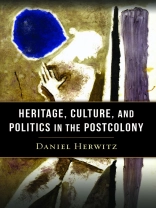The act of remaking one’s history into a heritage, a conscientiously crafted narrative placed over the past, is a thriving industry in almost every postcolonial culture. This is surprising, given the tainted role of heritage in so much of colonialism’s history. Yet the postcolonial state, like its European predecessor of the eighteenth and nineteenth centuries, deploys heritage institutions and instruments, museums, courts of law, and universities to empower itself with unity, longevity, exaltation of value, origin, and destiny.
Bringing the eye of a philosopher, the pen of an essayist, and the experience of a public intellectual to the study of heritage, Daniel Herwitz reveals the febrile pitch at which heritage is staked. In this absorbing book, he travels to South Africa and unpacks its controversial and robust confrontations with the colonial and apartheid past. He visits India and reads in its modern art the gesture of a newly minted heritage idealizing the precolonial world as the source of Indian modernity. He traverses the United States and finds in its heritage of incessant invention, small town exceptionalism, and settler destiny a key to contemporary American media-driven politics. Showing how destabilizing, ambivalent, and potentially dangerous heritage is as a producer of contemporary social, aesthetic, and political realities, Herwitz captures its perfect embodiment of the struggle to seize culture and society at moments of profound social change.
Зміст
Preface
Acknowledgments
1. The Heritage of Heritage
2. Recovering and Inventing the Past: M. F. Husain’s Live Action Heritage
3. Sustaining Heritage Off the Road to Kruger Park
4. Monument
5. Renaissance and Pandemic
6. Tocqueville on the Bridge to Nowhere
Epilogue
Notes
Index
Про автора
Daniel Herwitz directs the Institute for the Humanities at the University of Michigan and holds an honorary position at the University of Cape Town. His most recent book is
The Star as Icon: Celebrity in the Age of Mass Consumption, which was named a
Choice Outstanding Academic Title. He is also the author, with Lydia Goehr, of
The Don Giovanni Moment: Essays on the Legacy of an Opera and the editor, with Michael Kelly, of
Action, Art, History: Engagements with Arthur C. Danto. From 1996 to 2002, Herwitz served as chair in philosophy at the University of Natal, Durban, and was embroiled in the South African political transition, which led to his book
Race and Reconciliation: Essays from the New South Africa. Long involved with modern Indian art, his 1987 book,
Husain, won the country’s National Book Award.












